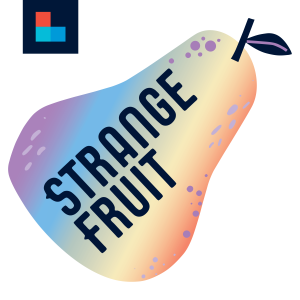
Strange Fruit #88: SCOTUS Does Everything By Doing Nothing; Raven-Symone & the Usefulness of Labels
 2014-10-10
2014-10-10
Download
Right click and do "save link as"
This week, the Supreme Court decided not to hear the marriage equality cases that were pending in Virginia, Indiana, Wisconsin, Oklahoma, and Utah. By doing so, they legalized same-sex marriage in many states immediately (including our neighbors to the north!), and paved the way for others to follow soon.
Fairness Campaign Director Chris Hartman joins us this week to talk about the decision, what it means, and what it doesn't—particularly for those of us in the Bluegrass State.
He also brings us news from Berea that makes this week bittersweet: After over three years of trying to pass an ordinance that would prohibit discrimination based on sexual orientation, the measure was voted down by the city council. We talk about the fight there and the dedicated Bereans who fought tirelessly for fairness.
Chris also sits in for our Juicy Fruit segment this week, where the topic du jour is labels. Actor Raven-Symone received much side-eye this week for telling Oprah that she doesn't identify as African American, but as American, and she doesn't identify as gay or bisexual, but as a "human who loves humans."
To Chris, it seems apropos to what he heard in Kentucky this week. "Those sorts of platitudes are exactly what we have faced in Berea and the other cities where people love to say, I believe in fairness for everyone, I don't wanna discriminate against anyone, everybody should be treated with human dignity, but I don't support [...] creating protected classes,'" he says.
Chris also pointed out the tendency of younger people to eschew labels—or in some cases, to identify as queer rather than specifically gay—because they don't remember a time when those labels were more necessary for solidarity and community building. "They don't want a closet to exist. I don't think any of us do. But we came from a place where closets were necessary."
Jaison gives Raven the benefit of the doubt. "I saw it more as an indictment of society's racism and homophobia," he says. "She said, 'If I allow you to label me as lesbian, if I allow you to label me as African American, I also allow you to insert upon me all those stereotypes that you think about blacks, and think about lesbians.' I just think that because she isn't a student of queer studies or black studies, she doesn't have the language to articulate that in a way that sounds better."
The consensus in our studio seems to be that if you're comfortable with yourself and confident in your identity, labels shouldn't make you uncomfortable.
"That's cool and all, that you don't do the label thing," Kaila says, "but thank god we had people like Audre Lorde, James Baldwin, Lorraine Hansberry, Zora Neale Hurston—people who weren't afraid to claim blackness, who weren't afraid to claim queerness. Thank god for those people."
view more
More Episodes
Strength, Survival, And Black Families
 2020-09-29
2020-09-29
 2020-09-29
2020-09-29
'Kitchen Table Wisdom' For And From Gay Men
 2020-09-19
2020-09-19
 2020-09-19
2020-09-19
Interracial Household Dynamics In 2020
 2020-09-11
2020-09-11
 2020-09-11
2020-09-11
Young Adult Fiction Author Arvin Ahmadi
 2020-09-03
2020-09-03
 2020-09-03
2020-09-03
'The Chi' Star Jasmine Davis
 2020-08-26
2020-08-26
 2020-08-26
2020-08-26
In Praise Of Quiet Allies
 2020-08-19
2020-08-19
 2020-08-19
2020-08-19
Interrupting Our Own Unconscious Biases
 2020-08-03
2020-08-03
 2020-08-03
2020-08-03
Loving Black People, Loving Black History
 2020-07-29
2020-07-29
 2020-07-29
2020-07-29
Live Streaming The Revolution
 2020-07-15
2020-07-15
 2020-07-15
2020-07-15
The Role Of New Media In Protest Coverage
 2020-07-07
2020-07-07
 2020-07-07
2020-07-07
Celebrating Pride Online
 2020-06-25
2020-06-25
 2020-06-25
2020-06-25
Breaking Stereotypes One Storybook At A Time
 2020-06-16
2020-06-16
 2020-06-16
2020-06-16
The Death Of Breonna Taylor
 2020-05-28
2020-05-28
 2020-05-28
2020-05-28
012345678910111213141516171819
Create your
podcast in
minutes
- Full-featured podcast site
- Unlimited storage and bandwidth
- Comprehensive podcast stats
- Distribute to Apple Podcasts, Spotify, and more
- Make money with your podcast
It is Free
- Privacy Policy
- Cookie Policy
- Terms of Use
- Consent Preferences
- Copyright © 2015-2024 Podbean.com




